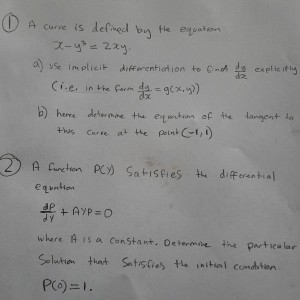Calculus Questions
Answer
1) You have a curve defined by
$$ x - y^3 = 2 x y, $$
a) Let's apply implicit differentiation
$$ \blue{ \frac{d}{dx}} x - \blue{ \frac{d}{dx}} y^3 = \blue{ \frac{d}{dx}}2 x y $$
$$ 1 - 3 y^2 \blue{ \frac{d y}{dx}} = 2 \left( y + x \blue{ \frac{d y}{dx}} \right)$$
$$ 1 - 3 y^2 \blue{ \frac{d y}{dx}} = 2 \left( y + x \blue{ \frac{d y}{dx}} \right)$$
$$ \blue{ \frac{d y}{dx}} \left( -3 y^2 - 2 x \right) = \left( 2y - 1 \right)$$
$$ \blue{ \frac{d y}{dx}} = g(x,y) = \frac{ 1-2y }{ 3 y^2 + 2 x }$$
b) To determine the tangent to this curve at the point (-1,1),
The tangent line equation at a point $P:(x_0,y_0)$ is given by,
$$ y -y_0 = m (x - x_0), \qquad m = \frac{d y}{dx}\bigg|_{x=x_0, y=y_0} $$
In our case the point is $P:(-1,1)$,
$$ y - 1 = \blue{\left( \frac{ 1-2y }{ 3 y^2 + 2 x }\right)}_{x=-1, y=1} (x +1),$$
$$ y - 1 = \blue{-1} (x +1),$$
$$ y - 1 = -x - 1,$$
$$ \red{\therefore y = -x }$$
2) For the second question we have the following Initial Value Problem,
$$ \begin{cases} \frac{d P}{d y} + A y P = 0 \\ P(0)=1 \end{cases}$$
In this case, we have a Linear Differential Equation of the form,
$$ \frac{d P}{d y} + \blue{T(y)} P = 0 $$
so we need to consider an integrating factor given by
$$ \mu(y) = e^{\int \blue{T(y)} dy} = e^{\int \blue{A y} dy}= e^{\frac{A}{2} y^2}.$$
Then, we multiply the integrating factor to both sides of the Differential Equation,
$$ e^{\frac{A}{2} y^2}\left(\frac{d P}{d y} + A y P\right) = 0 $$
$$\frac{d}{dy}\left[ e^{\frac{A}{2} y^2} P(y) \right] = 0 $$
Then, we integrate to both sides
$$ e^{\frac{A}{2} y^2} P(y) = \green{K }$$
$$ P(y) = \green{K }e^{- \frac{A}{2} y^2},$$
where $\green{K}$ is a constant value.
Finally, we need to evaluate the function at the initial point $P(0)=1$,
$$ P(0) = \green{K }e^{- \frac{A}{2} 0^2} = \green{K}= 1$$
$$\red{\therefore P(y) =e^{- \frac{A}{2} y^2}}$$
 Anthonysrc
Anthonysrc
- answered
- 3396 views
- $7.50

